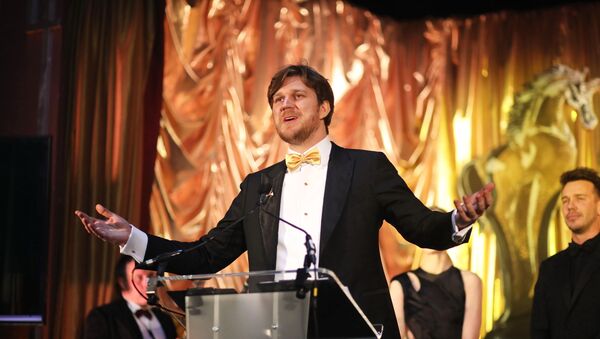The fourth annual Golden Unicorn Awards ceremony took place on Saturday evening at the Sheraton Grand Park Lane Hotel in London, uniting actors and actresses as well as business people, celebrities and elite filmmakers.
The ceremony was followed by a gala dinner and charity auction supporting the Naked Heart Foundation. Russian supermodel and philanthropist Natalia Vodianova founded the charity after the 2004 Beslan tragedy to support children with special needs.
Leading figures such as Danila Kozlovsky, Ravshana Kurkova, Alexander Petrov, Daria Moroz, Marina Zudina, Dmitry Dyuzhev, Alena Mikhailova, Alexey Uchitel, Dmitry Glukhovsky, Yuri Bykov, Mikhail Idov, Alexander Lungin, Grigory Dobrygin, Maria Agranovich, Klim Shipenko, Philipp Colberg, POLINA and many others saw the Golden Unicorn Awards become the most celebrity-packed Russian event in London.
Russian journalist and writer Mikhail Zygar and actress Svetlana Khodchenkova hosted the event, followed by the charity auction led by Mrs Vodianova and Sarah Reynolds of Christies, the event's charity partner, raising over £50,000.
Grammy-winning singer and songwriter POLINA also graced the stage, performing such hits as "Book of Love" and others, with further entertainment provided by actress Sabina Akhmedova.
Sponsors of the GUA 2019 included SIBUR, the Blavatnik Family Foundation as well as partners Attilus Caviar and Celebro.
The Golden Unicorn Awards: A Treasure of Cross-Cultural Exchanges
Filip Perkon, founder and general producer of the Golden Unicorn Awards, said that the event had "already become an important part of the filmmaking calendar, both in Russia and the UK".
The awards' unique approach held "two cross-cultural juries", which allowed international Russian films to be "judged by Russian standards", Mr Perkon said.
President of the international jury for the Golden Unicorn Awards, Linda Jensen, said that Russia, with its "rich history, great cultural heritage and talented people", was a "country with a deep well of stories waiting to be told through film".
— Russia in the UK🇷🇺🇬🇧 (@RSGovUK) December 1, 2019
She added: "As the film industry grows in the country and new talent emerge, there is a big potential for Russian content to be successful internationally.
Naked Heart France's Natalia Vodianova said that her charity relied "on the support and generosity" of its friends and partners.
She said: "Russian Film Week is an especially wonderful friend in allowing us to raise not only funds but also awareness of mental and physical disabilities. Our mission is to build an inclusive society where people of all abilities are able to thrive and I give my heartfelt thanks to the Russian Film Week and Golden Unicorn Awards for giving us the opportunity to showcase our work for children with special needs to their audiences as they come together to share the experience of film, and to raise funds essential to our work.
| Nomination | Winner |
| Best Film | Director Sergey Livnev, 'Van Goghs' |
| Best Screenplay | Writer Michael Idov, 'The Humourist' |
| Best Actor | Daniel Olbrychski, 'Van Goghs' |
| Best Actress | Anna Mikhailova, 'Another Woman' |
| Best Emerging Talent | Alena Mikhailova, actress, 'Love Them All' |
| Best Foreign Film with a Russian Connection | Director Kirill Mikhanovsky, 'Give Me Liberty' |
| Best Debut | Director Mikhail Idov, 'The Humourist' |
| Best Foreign Documentary on Russia | Director Sacha Slobodyanik, 'Buratino' |
|
|
Directors Robert Lence and Aleksey Tsitsilin 'The Snow Queen: Mirrorlands' |
|
Best Documentary |
Director Vera Krichevskaya, 'The Case of Sobchak' |
|
Best Short |
Director Anton Mamykin, 'White Mark' |
|
Best Russian Film on Ecology |
Director Marina Maria Mel'nik, 'Father Baikal' |
The Golden Unicorn Awards honoured movies showcased at the Russian Film Week Festival, which took place from 24 November to 1 December at major venues across the UK, including BFI Southbank, Ciné Lumière, Curzon Mayfair, ODEON Luxe Leicester Square and others, in London, Cambridge, Oxford and Edinburgh. The event was organised by Synergy University and Rock Films, and backed by the Russian Federation Ministry of Culture. Russian sponsors included Gazprom and the Blavatnik Family Foundation, in addition to partners such as Kaspersky, Pushkin House, the University of Edinburgh and many others.



